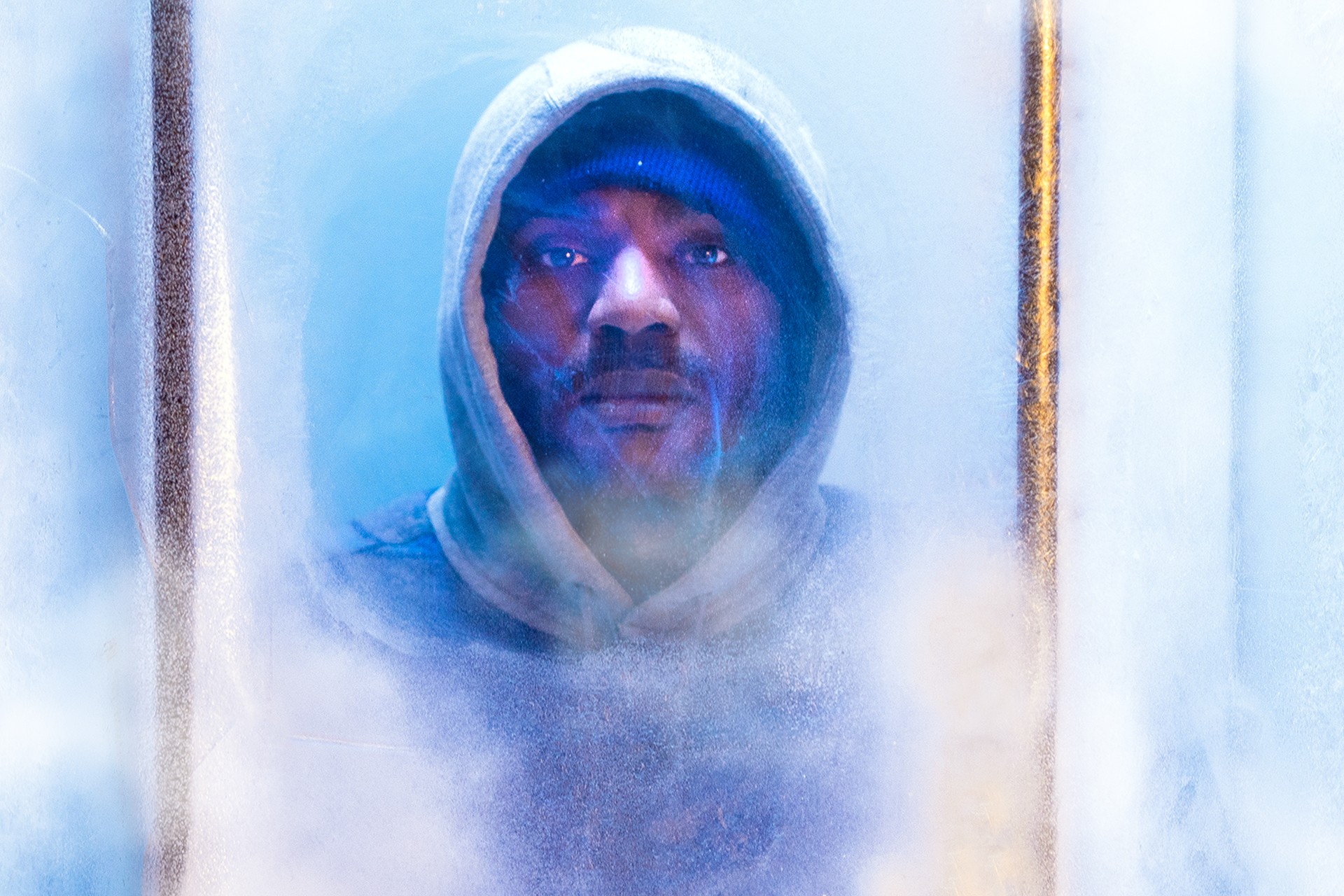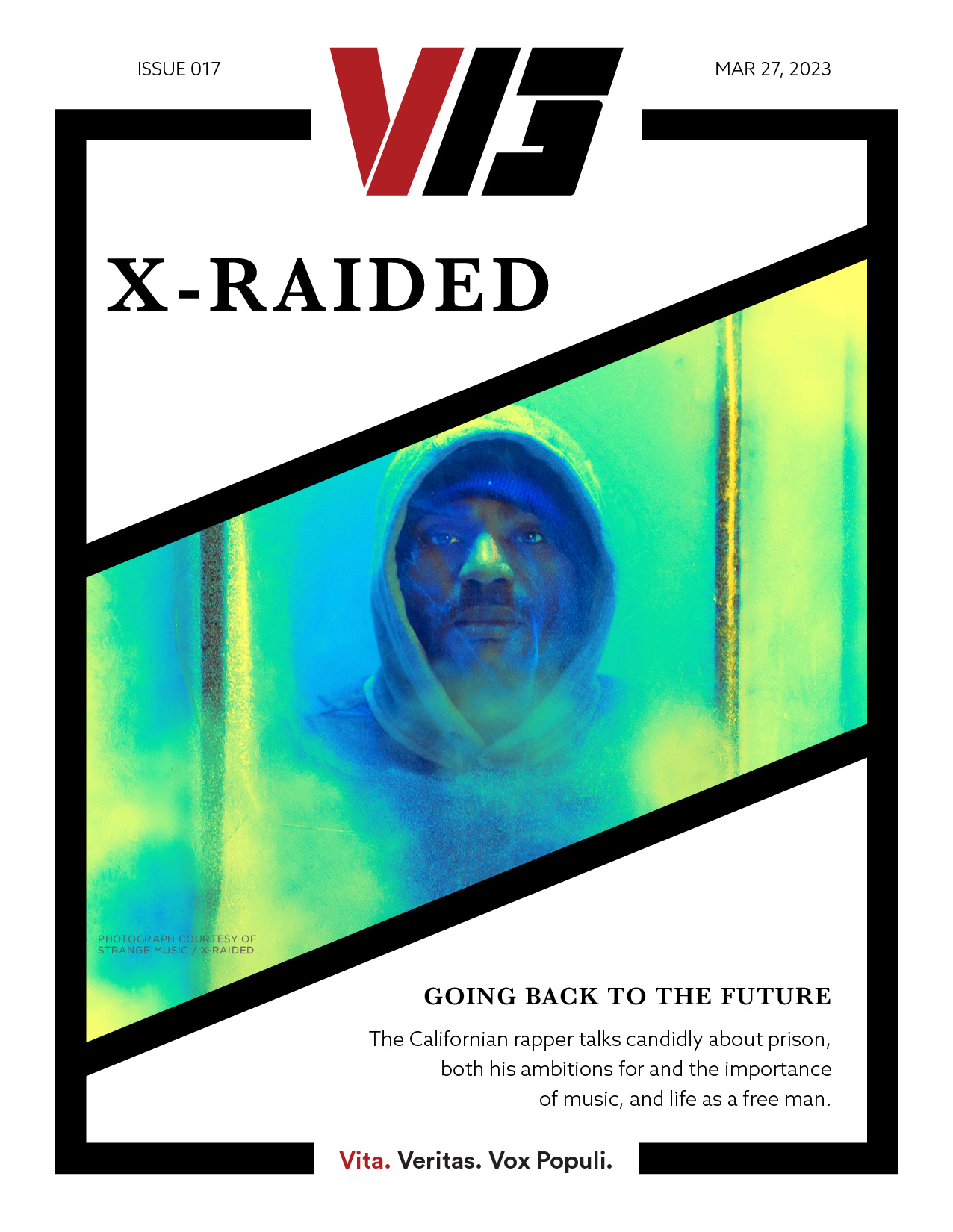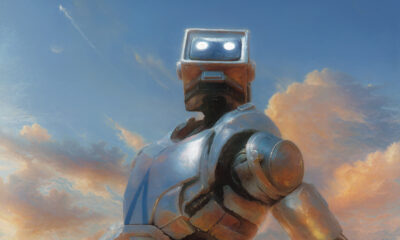

Hip-Hop/Rap
X-Raided: “I try to convey to people that you’re going to struggle being alive on Earth.”
In our latest Cover Story, Californian rapper X-Raided talks candidly about prison, both his ambitions for and the importance of music, and life as a free man.
We’ve all seen the glamorous side of the hip-hop world via the high-budget promo videos (and then some), but for Anerae Veshaughn Brown, aka X-Raided, hip-hop is so much more; and it got him through some of the most challenging years of his life.
From the age of 22 on, X-Raided spent twenty-six years incarcerated for murder before being paroled in 2018. Passing those years in prison, and preparing for release, the artist used his time behind bars to hone his skills as an MC. He was seriously studious, in many avenues, worked to perfect his bars, craft his message, and keep in mind his eventual freedom. Upon his release, the Californian rapper signed to Strange Music and, presently, is working on his new record, A Prayer From Hell.
In our latest Cover Story, we spoke at length with X-Raided who opened up about his experiences in prison, his ambitions as a musician, and the advice he would give anyone on the verge of heading down the same path he was on some thirty years ago.
Going back to the very start of the 90s, you put out your Psycho Active album; what were your ambitions?
X-Raided: “At that stage, I think my ambitions were to impress the people in my direct cluster, you know, we had in terms of Rhymes, myself, Brotha Lynch Hung, TripleSix at the time. So, you have all of us at the beginning in this cluster of MCs. I really did want TripleSix, and Brotha Lynch Hung to respect what I was doing, what I was writing. They were six or seven years older than me.
“So, for me, I looked up to them. I just wanted them to respect what I did, and I was starting to feel like I could really do this. I hadn’t gotten to the point of thinking about having millions of fans or thousands, hundreds of thousands of followers or things like that where we are now. I was really just thinking about making some dope music that my friends could respect. That was goal number one.”
Life took a darker turn for you back then. What are your memories of those initial months leading up to your incarceration? What was that like?
“That was one of the rougher periods of time in my life. I was 17 years old at the time. In the months leading up, my mother left Sacramento and went to Texas so I was in Sacramento with no parents, my father was in Alabama and I remember wanting to go out there. I remember telling him I finished my album.
“I felt like I needed to just kind of chill out for a while and see what happens. He didn’t have room for me, that was the way he put it. I had this sense. I just understood that there was a very dark energy surrounding almost everything at that period of time.
“So I was on the run from a juvenile facility. I was just running the streets. Every waking moment for me was just betting and gaming, being an active gangbanger and that’s what it was. Just the energy of it is the thing that I remember the most but I didn’t know that that darkness was present until it was gone. In the absence of it was what informed me of its presence of it. Now, when it comes back, I’m aware of it and I separate myself from that energy. But, yeah, it was a very dark period of my life for sure.”
“I went from 17 to 21 years old. Approaching my 22nd birthday. I’m not even the kid that I was when I first initially got incarcerated. The trial was part of a maturation process for me. I was coming to realize the severity of the situation.”
It got darker after that as you were incarcerated for 26 years. What kept you going through that because you must have hit some real low points?
“I think, initially, in the beginning, I was motivated by a desire, because essentially, you know, when you get sentenced to life at that period of time in the state of California, the Governor was Pete Wilson, there was less than 1% of people who were being granted parole, got a parole hearing and were being actually released at the time. 1%. So, literally, hopelessness is a word that we hear people throw around, but it was a hopeless situation.
“So, now you have to think about how you salvage the rest of my life, because, by the time I’m sentenced and sent to prison, I went from 17 to 21 years old, right? Approaching my 22nd birthday. I’m in that environment. I’m not even the kid that I was when I first initially got incarcerated. The trial was part of a maturation process for me. I was coming to realize the severity of the situation.
“The build-up to the trial was like, whatever, you know, you’re aware and I’d see the articles in the media but, until you get in that room, and there’s the judge and there’s a DA, the witnesses, and you’re just going through this for months then the weight of that very much impacts you psychologically.
“I think that can be heard in songs like “Deus – 5 to Life”, my music drastically changed. What I was motivated by in that period was a psychology that I was never going to be released. I just wanted to be like the dopest MC ever, I was obsessed with it. I was obsessed with making sure that my vocabulary was up to par. My transparency was up to par. My desire to make me the best MC ever actually opened my spirit up for me to understand the gravity of my circumstances. I really did make a list of what makes the dopest MC the dopest MC. I’m looking at Tupac. I’m looking at NAS, all these guys. You want to be introspective and retrospective, and as I started doing that, it was almost like taking a personal inventory and that started bleeding into my music.
“So really, that’s what kept me going was just writing songs. striving to be the best MC. It was like I went to school for rappers that’s what I did. I’d lock myself away with every dictionary I could get my hands on, on every book and I just lived for that. I woke up in the morning. Did my routine. Got a workout in and then it was how many verses can I write today? I was just in this constant battle with myself for years for that until the light at the end of the tunnel when I started realizing I had the opportunity to come home.”
When you realized that you’ve got that opportunity did you set yourself new goals and ambitions for when you got released? Or did you just take it day-by-day?
“Well, there was a little bit of both. The first time that I heard about this opportunity for this law to pass, there was a Supreme Court case that started off way down in the lower courts, it was called Miller Vs. Alabama. That case was working its way through the courts so we knew about that in the yard. Those of us who were paying attention and going to the library knew that Miller Vs. Alabama was working its way up to the Supreme Court and we’re hopeful that that will have some impact on those of us who were juveniles when we were arrested.
“Specifically, Miller Vs. Alabama was challenging the legitimacy of giving capital punishment to juveniles, that’d be the death penalty and life sentences. Should or should not a juvenile have an opportunity to demonstrate that they’ve grown beyond who they were when they committed their crimes? So that case had a lot of ripples. Between 2002 and 2012, was when Miller vs. Alabama turned into, ultimately, Senate Bill 260, California Senate Bill 260, which said that a juvenile should have a legitimate opportunity to be freed if they could demonstrate that they had changed their lives. That was when I realized I have an opportunity to get out of there. I started really trying to get my stuff together as much as I could… my education and self-help groups and things like that.”
“I’d lock myself away with every dictionary I could get my hands on, on every book and I just lived for that. I woke up in the morning. Did my routine. Got a workout in and then it was how many verses can I write today?”
Aside from the music industry, which we’ll talk about a bit later, a lot has changed in 26 years in the world. What had changed for you? What were the biggest changes you noticed when you came out of prison?
“Technology, definitely technology. Getting incarcerated in 1992 and then released in 2018. They jokingly would call me Marty McFly because it’s like Back to the Future for real. I’m like, people have cell phones walking down the street? The car, you know. I get my first car, the car starts talking to me. We had Knight Rider when I got locked up. Now my car is really talking to me like KITT. That was a trip.
“I also noticed a social disconnect somewhat where people were so focused on their phones. When I left, we still relied on person-to-person communication, direct communication, interaction, and things like that. That took some getting used to that. There was just a degree of things that were just so formal and impersonal. I had to really adjust to that and navigate with that to realize that that’s just the way it is.
“People are in the same room texting each other. You know, only you figure that out. This person started laughing. They laugh and they look at each other and I will be like, you guys are texting.. did I get to the text? Then I get the text and it’s a meme. Everybody in the room is laughing at a meme but nobody is really saying anything to each other. It was really weird but I had to learn that that’s what it is.”
There’s a lot of talk about how, when people come out of prison, they’ve got nothing to look forward to. The family has gone. There are no jobs, no money, and no home. You threw yourself into your music when you came out of prison. How important was it having that when you came out of prison and having a goal to aim towards? Was that important for you?
“It was majorly important. I’m not sure what I would have done if it wasn’t for hip-hop. I tell people my ethnicity is hip-hop. I believe in the culture of hip-hop, from its pure stages of it, and what it did for my life.. for education. I just really love the institution of hip-hop, the real hip-hop. I believe that coming home and having this vocational skill to me was a job. I have the ability to do this for a living. It’s technically really the only job I’ve ever had as an adult. It’s the only job I have ever had.
“So, I think without it, things would have been interesting for sure. I’ve seen men who do lose their family members, and it’s an unsympathetic population. The population has a disregard for what the inmate population and the formerly incarcerated person population is going through because it’s like, well, that’s what they did. I even have a hard time being empathetic to somebody who may have done one thing or gone one step too far. Do you know what I mean? Even among outlaws, we have that perspective. I don’t know that I’ll ever get over some of it but I do understand that people have a hard time seeing a citizen coming home and understanding not being able to get a job or not having credit.
“So, you got a guy coming home, he can’t get an apartment, you know, Where’s he gonna live? So now we have this person who has the ability to be a criminal, he’s very good at it, he’s hung out in a place where they only got better at that if you want to be and now he has no options you have this person who is very dangerous in our communities. When I look at other countries Germany is doing a better job of rehabilitating their population than the United States of America, statistically, so is Japan and you know, all these other countries, and I just think that we’re supposed to be doing a better job, reintegrating people, and restoring their constitutional rights, as opposed to bringing them home with the new scarlet letters, felony, the F is the new scarlet letter. Did you get one of those? Well, you can’t get a job, you can’t get your apartment but, if you’re in another country, they want you to get back as a contributing member of society, a taxpayer, somebody that they can reinstall or instill the understanding that you’re a participant in the country.
“The population has a disregard for what the inmate population and the formerly incarcerated person population is going through because it’s like, well, that’s what they did. I even have a hard time being empathetic to somebody who may have done one thing or gone one step too far.”
“Now, because the criminal believes in that lifestyle, for me, as a gang member, I had a disconnect with the United States of America and my place as a citizen. I didn’t understand what it meant to be a citizen of the country or a participant as a citizen. That’s not being taught. Even if I decide I learned it all and I don’t really believe in it, I still need to know how to utilize it. My argument is that we have people who know the rules of football more than they know the rules of being an American. They can tell you what hold means but they couldn’t tell you what their Bill of Rights is.
“I think it’s just important for people to have that opportunity to have their rights restored and that’s kind of what I’m on. I would like voting rights to be restored. If a person’s done enough time off of parole, I’d like their full constitutional rights to be reinstalled, including their right to bear arms. I want to do different things so they can participate as a real citizen.”
Following on from that, you’ve said that you’re an advocate for reform. Firstly, what advice would you give someone who’s not quite crossed a line of obviously going to prison, but is headed down that path?
“I deal with this question a lot. Most of the time, people who are involved in these lifestyles, first, there’s a lifestyle addiction at work, but it’s really big so people are struggling. The very practical people don’t want to admit they’re struggling but, for the most part, they’re struggling. What I try to convey to people is that you’re going to struggle, being alive on Earth, it’s going to be a struggle, it doesn’t matter who you are.
“You can make your struggle look pretty and you can struggle hard enough to make your struggle less of a struggle but everybody has got to deal with their stuff. So, I tell people, do you want to struggle with both your hands tied behind your back or struggle free with an opportunity to improve your circumstances? I tell people it can get worse, it can get more difficult. It can be a self-inflicted wound and I try to encourage people to stay focused on their education.
“Keep going and, one day, the people who they say are the nerds and dorks end up being the cool kids who got jobs and all the girls. Stick it out and finish what you’re doing. It works out.”
What about the other side to that? What about those juveniles that have crossed that line? What advice would you give somebody that’s just starting on that path?
“I say as soon as possible, as early as possible for them to start participating in rehabilitative programs. Get involved in self-help groups and focus on their education. I saw inside a California prison system where older guys would be more proud of things starting getting their lives together. They’re going to groups and stuff and they tell the youngsters like, Oh, look at you, you know, you didn’t do this. You didn’t do that. But, I tell a young guy, that if he starts working on his education immediately you’re smarter than the guy that took 20 years to figure out that he needed to go to school.
“Initially, when I first got in there I only did it because it was the only way to go outside. So, I didn’t even go to school because it was good for me, I went because I wanted to go outside and play basketball or something. Eventually, I figured it out so I used to tell people it took me 10 years to start focusing on my education. That’s what I would do with the guys that I mentor. I would tell them you got a better shot and head start on it than I do because I took too long and you started right now. Be proud of that, keep going, and beat me.
“A lot of those dogs took that to heart and I would get those kids going. So that’s my advice to them is, as soon as possible, look up to guys who are going to be doing the same thing forever on the pull-up bars, on the dip bars. The older you get the more, all due respect, the more pathetic it is the more pathetic man. I saw a guy with grey French braids, great French braids, no shirt, and sagging pants doing dips. Great look, a great body to do. He was beautiful but it traumatized me because I thought that was going to be me. That’s my future. If I didn’t watch it, I was gonna be that guy that would have saggy pants. It’s a reality check. Man, that was a big wake-up call for me in 2005. When I saw that, I just thought no, man, not me, man.”
It must have given you that drive to say, you know, one day I’m gonna get out of it and I’m going to be able to contribute back to society. It must have been a real driver to see people like that think and I don’t want to go down that path…
“Definitely. I got in some trouble one time and there was the Sergeant who couldn’t understand what my problem was. It’s funny because most people would have said that he was racist if they looked at him. One day that man stopped me and he told me he couldn’t understand why I didn’t just do what I was supposed to do. ‘You’re famous. You got money. You got food. You got everything you need. You get visits. For the life of me. I can’t comprehend why you want to get in trouble.
“I told him I’m never going home. He said ‘Who told you that? How do you know that’s true?’ This is seven years before the law changes. This big old guy, six foot five, muscular, out here just terrorizing the yard every day that’s what he lives for and he just had this moment with me where he thought ‘man, you got all this talent, all this potential but you’re just out here doing whatever you like, man, what is it?’ I told him the truth. I’m never getting out of here so I may as well enjoy myself.
“He was like, ‘Nah, I don’t know who told you that but you will go on one day, if you start working on it, you will go’ and it just resonated for me. I don’t know why? Maybe because it came from him? He wasn’t the right person to say that because he’s the person who shouldn’t have said that. He’s the last person, if I had to bet my life on who would have told me that I would have lost because I never would have thought it was him. That resonated with me for years and I remembered that. I just didn’t want to be that guy.”
“The very practical people don’t want to admit they’re struggling but, for the most part, they’re struggling. What I try to convey to people is that you’re going to struggle, being alive on Earth, it’s going to be a struggle, it doesn’t matter who you are. ”
To be fair, he was right. You’re here now and you’ve got a new album coming out A Prayer In Hell. Can you just talk us through what you hope that album represents and what you want your fans to get out of listening to it?
“I think that the album is a journey. I tell people that if Jordan Peele wrote an album this will be it. It’s got twists and turns, plot twists. It’s a full body of work. The thing that I want people to take away from it is that they are the authors of their own destinies. That they are not defined by what they do. You’re defined by who you are, and how you respond. That’s the thing I’m responding with by being a source of positivity, a demonstration that you can redeem yourself through perseverance and just never giving up.
“I really want people to come away from listening to the album feeling motivated to overcome their own personal obstacles in their lives and understand their own journey and their relationship with time. That’s what I want and for people to understand we don’t have forever. If you got something you believe in, you want to do, there is no ‘I’ll get to it in a week or so’ it’s right now, we got to start right now. There’s no such thing as tomorrow, it’s just right now then the sun is on the other side of the planet, it’s always right now.
I just hope that people take that away – the immediacy and the importance of being involved as a dictator in their own lives. Self-efficacy in being, you know, someone who was just doing things with great intent intentionally. That’s what I want to do. And that’s what I want to convey.
Was the material on the album written while you were in prison?
“Actually, I wrote the entire album outside of prison, except for two songs. I have two songs that just stayed with me and I found to be important for this project then there’s another idea I had, and it’s funny, my album, the theme is kind of about this subject. I had an awareness that I was not spiritually and mentally prepared to write some of the verses, but I knew the subject.
“I would take like, “Kal-El”, I knew I wanted to call the song “Kal-El”. I had the chorus. I had the bridge, and I wrote what I call the skeleton. I knew when it was time to build these bars in, I’m gonna know what I’m supposed to say, so I left those chunks blank and then that happened. I went into the studio with Robert Rebeck. He hit record, and it just flowed out, right there on the microphone.
“I didn’t come in there with anything written down. I just had the skeleton, then I plugged in and everything else was what I felt at that moment and that’s one of the themes on my album, the way that you have your relationship with time. That was a trip for me psychologically. So, I got two songs, “Life Sentences”, and ‘To Whom It May Concern’, which were both written while I was incarcerated and the chorus and the bridge to “Kal-El” was written while I was incarcerated, then the verses were written in the studio. I got 1000s of songs from prison, I just haven’t looked at them yet.”
Is that something you plan on looking at doing something with?
“I will. Sometimes I’ll hear music, and I’ll say that’s good. That’s kind of what happened with those two songs I did in use. It was the music. When I heard the music. I knew what to do with that and I just put those two out. I’ll continue to do that. As I’ve been mapping out the next project, I got a few ideas in my folders.”
I interviewed someone recently and we were talking about the inspiration for writing and it came in the strangest of places. He told me how he was going into the studio to record his album and he had one song with no lyrics. He sat on the tube in London and looked up at the map he just got the inspiration for the song so he wrote the lyrics on the way into the studio. It’s this inspiration that comes up anywhere…
“Yeah. I love that part of the process. I like the pressure. In the environment where I spent a great majority of my life, I was a battle rapper. Every rapper that showed up, you know, I was one of the only real rappers anybody would really meet in that environment. If somebody wanted to make music or an album from that environment, I was the standard.
“I was the Tupac of that environment. So, every little rapper, and some of them I mean, were good, really good they would hunt me down and want me to hear their rap that they all had. As MCs, we all know our favorite verse to pull out when we want to impress somebody. It never fails. I’d be happy to hear whatever anybody else had. I was always ready. It made me where I had to have new material all the time and I just became that person that I really thrived on the pressure.
“It’s a terrifying process sometimes where I remember I was writing ‘Parasitic’ and trying to finish ‘Many Apologies’ and I had this brief moment where I felt like holy shit it wasn’t coming out. I didn’t like what I had and it wasn’t working out the way I wanted and the clock is ticking. I’m thinking ‘I gotta get into the studio… I gotta turn this album out man’ and I just ended up driving with many topologies downloaded in my brain. Chunks of it. Paragraphs, just boom, boom, boom. I’m like trying to say it on my phone so I won’t forget that thing. And then the same thing, I’m sitting in the tub finally and I kind of I got the beat planned that I’m trying to forget about lyrics then it just downloaded boom, I got the whole song.
“Sometimes I like to just walk in and onto the microphones, they turn the beat on and I get that inspiration the first time I hear the track. I’ll listen to enough of the track to know that I like it and turn it off. The next time I hear it, it’ll be in the studio in front of a microphone, and then boom, and it just happens, man. I don’t know how long I’m gonna keep getting away with that but right now, man, it’s like riding a wave.”
That’s a good position to be in. What I wanted to talk about, just to wrap up a couple of things is how, from 1992 to 2023, the music industry changed dramatically. I got into music back in the late 80s, and early 90s. I was that metal kid growing up in the underground scene. I think it’s very similar to the hip-hop scene. Now, in 2023 it’s very different with TikTok, and social media. What was it like coming out of prison into essentially a completely new industry?
“Wow. That’s a great question. I feel like I’ve benefitted from having been gone so long because the one thing that I wanted, I want it to come in the future. I didn’t have illusions about that part. I was startled by some things – the interpersonal relationship dynamics, the way people communicated, socio-political interactions, and things like that. But, in terms of the way the industry has changed, getting in the studio, the way we have to release music, I was really excited to engage in that part and I felt like I knew I could do it. I felt like I was good enough.
“I know, everybody thinks they’re the best. I felt like, very, very, very supremely good rappers would hear my music and think I was one of them, and that mattered to me. I feel like I belong in that club. So, to have TechN9ne or to be able to work with King Crook, amazing MCs like King ISO. There’s a fraternity of MCs, whether it’s admitted or not, to where we know who each other is. It’s like kung-fu. I know you got good kung-fu. I can watch and I can say that guy right here knows what he’s doing.
“I felt excited to be able to get involved in that part of it and it’s been very rewarding for me in a very short period of time. I’ve been able to get established To me, with strange music to be riding shotgun with TechN9ne and King ISO. it’s a very beautiful experience. That part for me was a challenge that I was prepared for mentally. I feel good about my chances.”
Now you’re out of prison and you have your music to work on, would you go back to prison to talk to young prisoners about your story and your experiences and be part of a rehabilitation program? Is that is that something you’d like to do?
“Absolutely. I have a great relationship with Lewis Reed of Reform. He’s the director of Reform. I love him. He’s a great person, and he’s somebody that I’m in constant communication with and then one of my artists for Blackmarket Records, Bobby Gonzales, is actually employed at ARC, the Anti Recidivism Coalition, which was founded by Scott Budnick, who’s the director of The Hangover films. We had an opportunity for me to go into Valley State Prison with Bobby Gonzales and tell my story, but it kind of conflicted with the video shoot I had. So, by the time I got the clearance, which I did, I had a video shoot, and my travel was gonna be really tricky so I wasn’t able to go.
“I and TechN9ne also had an opportunity to go into the facility at RJ Donovan in San Diego during the Asn9ne Tour but it got really crunchy trying to sort. This is something that’s going to be a passion of mine going forward. That’s where I see my career almost amalgamating with that. Criminal justice reform is my platform, something I’m very passionate about, and if I can help the kids, as someone who has been through some of the things that they think are rites of passage, I’ve been through those rites of passage and I’ve come out the other side.
“I know what is and is not legitimate, and I just want to be someone who tells them the truth. I don’t want to glorify myself. I’ll tell people if I got out of prison talking about I’m a super crip. And I’m the biggest gangster. Nobody in hip-hop history has ever been through what I’ve been through 26 years; if I did that mandate, it gave me $20 or $20 million deals on me the biggest distribution company on Earth, you know, put every microphone in front of my face, and I just felt like it was a dishonorable thing to do.
“I made a promise to the universe and to my power that I was going to do things the right way. If I was able to come home, and miraculously huge things happen for me to be sitting in this chair right now in this big old house, you know, in Kansas City, Missouri, of all places, right down the street from Strange Music headquarters, if somebody told me this was gonna happen five years ago, I would get up and do my normal routine and go tell my friend I had a crazy dream.
“I had the most insane dream ever. I went on tour with TechN9ne. I signed with Strange Music, and I performed in front of 12,000 people. I would think it was a dream. I’m conscious that something like this doesn’t happen. So, to think that I could come home and be dishonorable toward the energy that unlocked those doors for me, I just think it’s just a dishonorable thing to do.
So, I want the kid out there who’s looking up to see all these guys doing the talk, all that stuff. Well, it’s time; now they see the handcuffs coming up. We’re finding out who’s who. They’re starting to tell on each other. People don’t want to go to jail, but it sounded good on that album. When they put that album out, they put that video out, and they look good. These kids don’t know. Not all of them know how to differentiate between entertainment and reality.
“There are people who believe this stuff and think it’s real. I was one of those ones from California. I come from where that culture really exists, it really is like that. We’re seeing change now but I just don’t want to be the guy who tells the younger me that I need to be preparing myself to go to prison like it’s some type of rite of passage or how harming another human being is gonna make me somehow more validated as a person.
“I want to be a source of healing and make sure that for those kids, while I might not be able to get everybody, maybe only just a few of them, I can have the impact of just changing one person’s life, or one person taking the message on board. I think it’s the honorable, the right thing for me to do. Me, I look at myself in the mirror in the morning, and I represent that. That’s the life I want for myself. Forever.”
-

 Music1 week ago
Music1 week agoTake That (w/ Olly Murs) Kick Off Four-Night Leeds Stint with Hit-Laden Spectacular [Photos]
-

 Alternative/Rock2 days ago
Alternative/Rock2 days agoThe V13 Fix #011 w/ Microwave, Full Of Hell, Cold Years and more
-

 Alternative/Rock1 week ago
Alternative/Rock1 week agoThe V13 Fix #010 w/ High on Fire, NOFX, My Dying Bride and more
-

 Features1 week ago
Features1 week agoTour Diary: Gen & The Degenerates Party Their Way Across America
-

 Culture1 week ago
Culture1 week agoDan Carter & George Miller Chat Foodinati Live, Heavy Metal Charities and Pre-Gig Meals
-

 Music1 week ago
Music1 week agoReclusive Producer Stumbleine Premieres Beat-Driven New Single “Cinderhaze”
-

 Indie2 days ago
Indie2 days agoDeadset Premiere Music Video for Addiction-Inspired “Heavy Eyes” Single
-

 Alternative/Rock2 weeks ago
Alternative/Rock2 weeks agoThree Lefts and a Right Premiere Their Guitar-Driven Single “Lovulator”


















